1-1全新版大学英语综合教程第一册 Unit1
- 格式:doc
- 大小:48.00 KB
- 文档页数:16

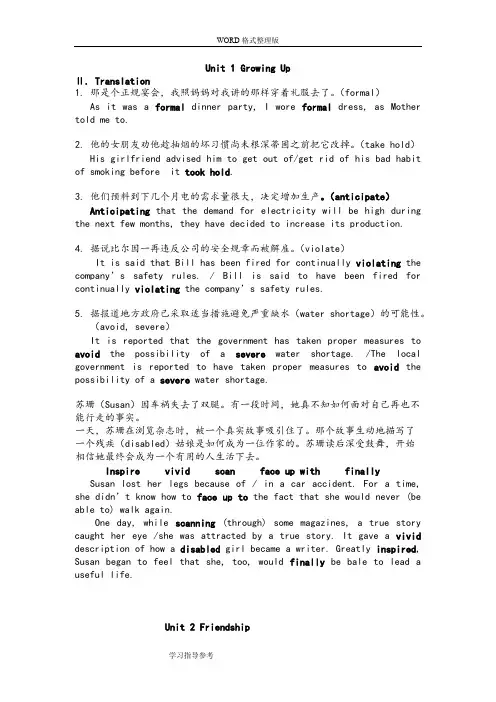
Unit 1 Growing UpⅡ. Translation1.那是个正规宴会,我照妈妈对我讲的那样穿着礼服去了。
(formal)As it was a formal dinner party, I wore formal dress, as Mother told me to.2.他的女朋友劝他趁抽烟的坏习惯尚未根深蒂固之前把它改掉。
(take hold) His girlfriend advised him to get out of/get rid of his bad habit of smoking before it took hold.3.他们预料到下几个月电的需求量很大,决定增加生产。
(anticipate)Anticipating that the demand for electricity will be high during the next few months, they have decided to increase its production.4.据说比尔因一再违反公司的安全规章而被解雇。
(violate)It is said that Bill has been fired for continually violating the company’s safety rules. / Bill is said to have been fired for continually violating the company’s safety rules.5.据报道地方政府已采取适当措施避免严重缺水(water shortage)的可能性。
(avoid, severe)It is reported that the government has taken proper measures to avoid the possibility of a severe water shortage. /The local government is reported to have taken proper measures to avoid the possibility of a severe water shortage.苏珊(Susan)因车祸失去了双腿。
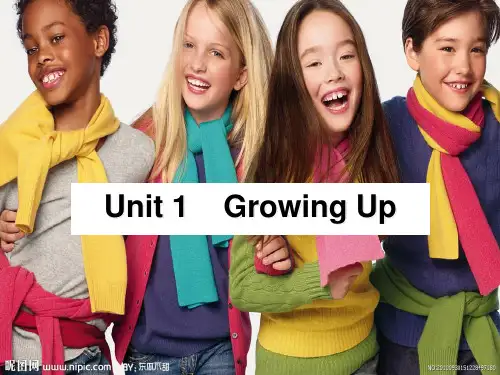
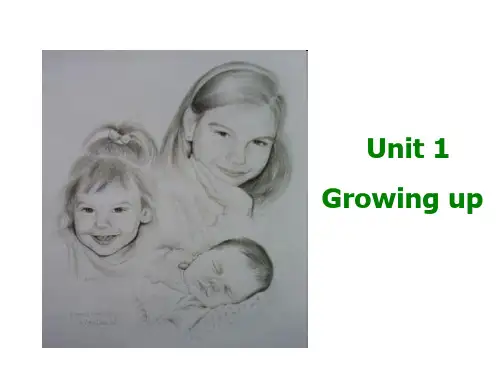
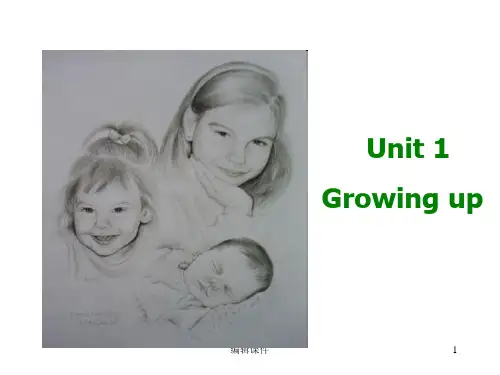
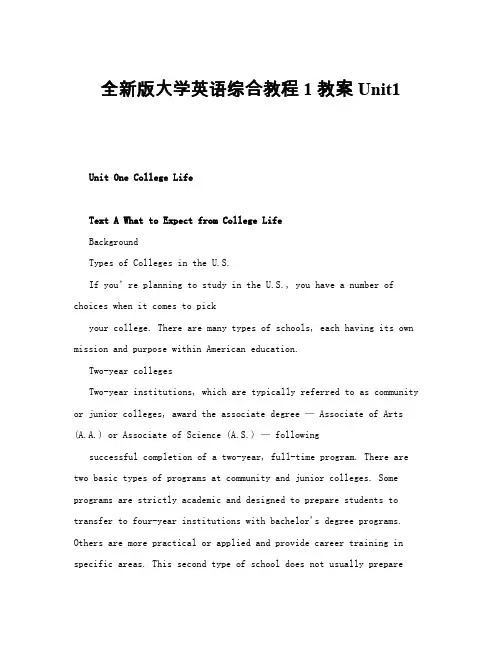
全新版大学英语综合教程1 教案Unit1Unit One College LifeText A What to Expect from College LifeBackgroundTypes of Colleges in the U.S.If you’re planning to study in the U.S., you have a number of choices when it comes to pickyour college. There are many types of schools, each having its own mission and purpose within American education.Two-year collegesTwo-year institutions, which are typically referred to as community or junior colleges, award the associate degree — Associate of Arts (A.A.) or Associate of Science (A.S.) — followingsuccessful completion of a two-year, full-time program. There are two basic types of programs at community and junior colleges. Some programs are strictly academic and designed to prepare students to transfer to four-year institutions with bachelor's degree programs. Others are more practical or applied and provide career training in specific areas. This second type of school does not usually preparestudents for transfer to a four-year institution, though some of the credits earned may still be accepted by a four-year institution.A small number of two-year colleges offer the final two years of the undergraduate program only, awarding the bachelor‘s degree rather than the associate degree. Most community and juniorcolleges are publicly supported by the state and local communities, although some are private. Some private two-year colleges areproprietary or run for a profit.Four-year colleges and universitiesThe college or university (sometimes called an institute when it emphasizes engineering or other technical courses) awards the bachelor's degree. The Bachelor of Arts (B.A.) or Bachelor of Science (B.S.) degrees are the most common, but a variety of bachelor's degrees by other names are also granted. Bachelor's degrees are typically awarded following successful completion of a four-year, full-time program. Programs in some fields of study or at some institutions can be longer than four years. There are both public and private colleges and universities in the United States, and some have an affiliation with a religious denomination.Public versus privatePublicly supported schools are generally state colleges or universities or two-year community colleges. These institutions receive most of their funding from the states in which they are located. Private schools generally have higher costs because they do not receive the sameprimary funding from the state and federal government. Colleges and universities with religious affiliations are private. Most of them are Christian (Roman Catholic and Protestant), although there are a small number of Jewish and Islamic institutions. In most cases, you do not need to be a member of a particular church or religious group to attend a religiously affiliated college and enrollment in these institutions will not usually interfere with your own religious views. Privately owned colleges Proprietary institutions are different from other types of schools in that they are privately owned and run for a profit. They are "educational businesses" that offer services and courses similar to those at other institutions, but you need to be very careful and research their accreditation status. Their programs tend to be technical and pre-professional courses of study.Almost all the colleges in the United States are now coeducational, which means that both men and women attend. There are also a small number of single-sex schools, some for men and some for women. Faculty, administration, and staff members will likely be of both sexes at any college.Words and Expressions1.a little bit有点He was a little bit under the weather. , 他生病了。
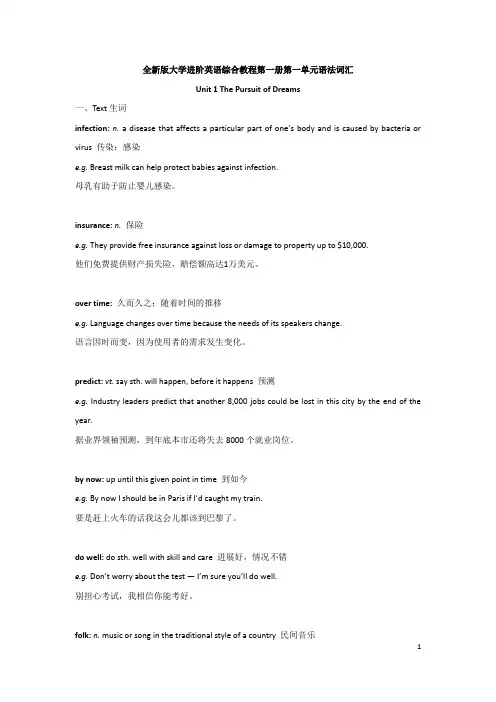
全新版大学进阶英语综合教程第一册第一单元语法词汇Unit 1 The Pursuit of Dreams一、Text生词infection: n. a disease that affects a particular part of one’s body and is caused by bacteria or virus 传染;感染e.g. Breast milk can help protect babies against infection.母乳有助于防止婴儿感染。
insurance: n. 保险e.g. They provide free insurance against loss or damage to property up to $10,000.他们免费提供财产损失险,赔偿额高达1万美元。
over time: 久而久之;随着时间的推移e.g. Language changes over time because the needs of its speakers change.语言因时而变,因为使用者的需求发生变化。
predict: vt. say sth. will happen, before it happens 预测e.g. Industry leaders predict that another 8,000 jobs could be lost in this city by the end of the year.据业界领袖预测,到年底本市还将失去8000个就业岗位。
by now: up until this given point in time 到如今e.g. By now I should be in Paris if I’d caught my train.要是赶上火车的话我这会儿都该到巴黎了。
do well: do sth. well with skill and care 进展好,情况不错e.g. Don’t worry about the test —I’m sure you’ll do well.别担心考试,我相信你能考好。
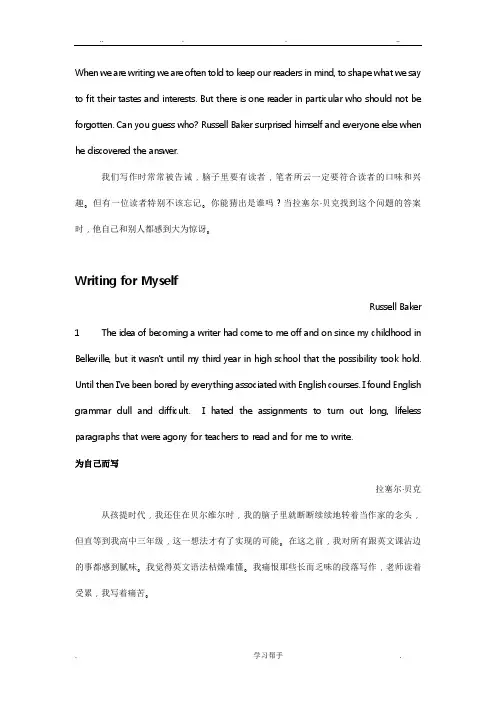
When we are writing we are often told to keep our readers in mind, to shape what we say to fit their tastes and interests. But there is one reader in particular who should not be forgotten. Can you guess who? Russell Baker surprised himself and everyone else when he discovered the answer.我们写作时常常被告诫,脑子里要有读者,笔者所云一定要符合读者的口味和兴趣。
但有一位读者特别不该忘记。
你能猜出是谁吗?当拉塞尔·贝克找到这个问题的答案时,他自己和别人都感到大为惊讶。
Writing for MyselfRussell Baker 1 The idea of becoming a writer had come to me off and on since my childhood in Belleville, but it wasn't until my third year in high school that the possibility took hold. Until then I've been bored by everything associated with English courses. I found English grammar dull and difficult. I hated the assignments to turn out long, lifeless paragraphs that were agony for teachers to read and for me to write.为自己而写拉塞尔·贝克从孩提时代,我还住在贝尔维尔时,我的脑子里就断断续续地转着当作家的念头,但直等到我高中三年级,这一想法才有了实现的可能。
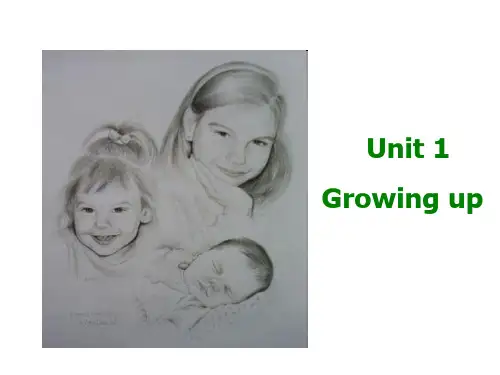
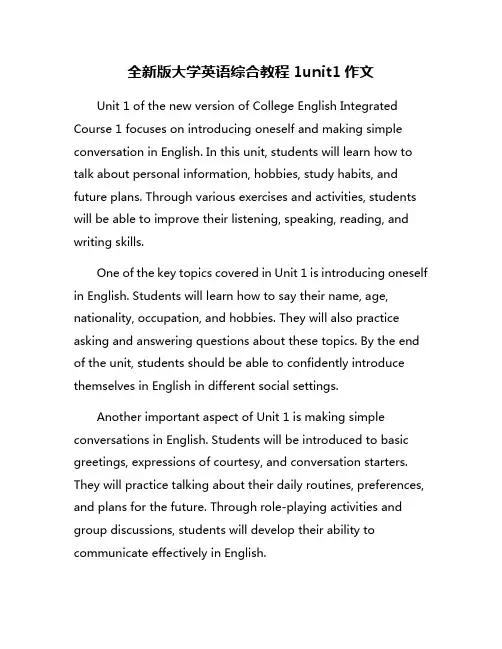
全新版大学英语综合教程1unit1作文Unit 1 of the new version of College English Integrated Course 1 focuses on introducing oneself and making simple conversation in English. In this unit, students will learn how to talk about personal information, hobbies, study habits, and future plans. Through various exercises and activities, students will be able to improve their listening, speaking, reading, and writing skills.One of the key topics covered in Unit 1 is introducing oneself in English. Students will learn how to say their name, age, nationality, occupation, and hobbies. They will also practice asking and answering questions about these topics. By the end of the unit, students should be able to confidently introduce themselves in English in different social settings.Another important aspect of Unit 1 is making simple conversations in English. Students will be introduced to basic greetings, expressions of courtesy, and conversation starters. They will practice talking about their daily routines, preferences, and plans for the future. Through role-playing activities and group discussions, students will develop their ability to communicate effectively in English.In addition to language skills, Unit 1 also focuses on building students' confidence and motivation to learn English. By setting achievable goals, providing positive reinforcement, and fostering a supportive learning environment, teachers can help students overcome their fears and doubts about learning a new language.Overall, Unit 1 of the new version of College English Integrated Course 1 provides students with a solid foundation in basic English communication skills. By mastering the content of this unit, students will be well equipped to continue their English learning journey and expand their language abilities in the future.。
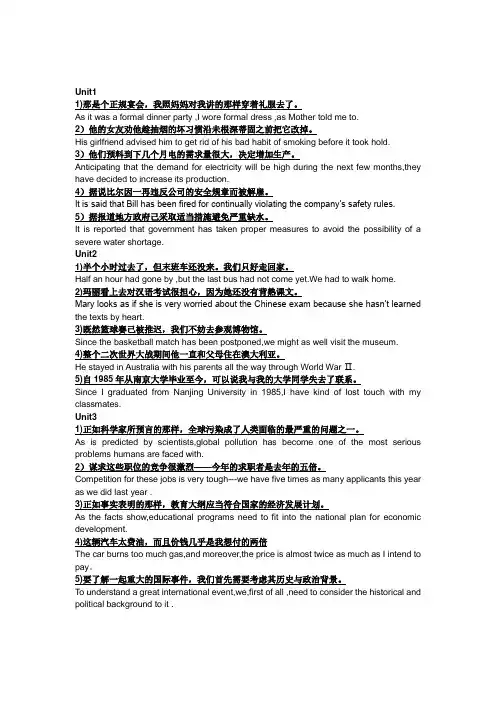
Unit11)那是个正规宴会,我照妈妈对我讲的那样穿着礼服去了。
As it was a formal dinner party ,I wore formal dress ,as Mother told me to.2)他的女友劝他趁抽烟的坏习惯沿未根深蒂固之前把它改掉。
His girlfriend advised him to get rid of his bad habit of smoking before it took hold.3)他们预料到下几个月电的需求量很大,决定增加生产。
Anticipating that the demand for electricity will be high during the next few months,they have decided to increase its production.4)据说比尔因一再违反公司的安全规章而被解雇。
It is said that Bill has been fired for continually violating the company’s safety rules.5)据报道地方政府己采取适当措施避免严重缺水。
It is reported that government has taken proper measures to avoid the possibility of a severe water shortage.Unit21)半个小时过去了,但末班车还没来。
我们只好走回家。
Half an hour had gone by ,but the last bus had not come yet.We had to walk home.2)玛丽看上去对汉语考试很担心,因为她还没有背熟课文。
Mary looks as if she is very worried about the Chinese exam because she hasn’t learned the texts by heart.3)既然篮球赛己被推迟,我们不妨去参观博物馆。
全新版大学英语综合教程第一册第二版课件Unit1幻灯片76D R _ word _ off and onoff and on (or on and off):from time to time; now and again; irregularlyIt has been raining on and off for a week. That’s why the clothes feel damp.As her patient slept soundly during the night, Nurse Betty was able to doze off and on in a bedside chair.幻灯片77D R _ word _ take holdtake hold:become establishedThe idea of one child has taken hold in many Chinese families.老习惯是很难摆脱的。
这就是为什么你要在习惯养成前戒烟。
Old habits die hard. That’s why you should stop smoking before the habit takes hold. 幻灯片78D R _ word _ bore 1bore: vt.make (sb.) feel tired and lose interestThe speaker went on and on, and the audience grew bored by his speech.T om Sawyer grew bored with painting the garden fence, so he thought of a way to make others paint for him.幻灯片79D R _ word _ bore 2Collocation:讨厌至极的人/事a crashing borea frightful bore讨厌得要命的家伙an insufferable bore讨厌得令人无法忍受的人an utter bore极惹人厌烦的事幻灯片80D R _ word _ associateassociate: vt.join or connect together; connect or bring in the mind我们总是把埃及与金字塔联系起来。
Title: Embracing Change: A Journey ofGrowth and DiscoveryIn the fast-paced world of today, change is inevitable. It is a constant force that shapes our lives, pushing us to adapt and evolve. The unit one of the New Edition of College English Integrated Coursebook, which focuses on the theme of change, resonates deeply with this idea. It encourages us to embrace change, to see it as an opportunity for growth and discovery, rather than a threat to our stability.Change can be both exciting and daunting. It brings new experiences, new challenges, and often, new opportunities. However, it also requires us to let go of the familiar, to step into the unknown. This can be difficult, as it involves a leap of faith and a willingness to take risks. Yet, it is this willingness to embrace change that defines our growth as individuals. As we navigate through the twists and turns of life, we learn to be resilient, to adapt to new situations, and to find strength within ourselves. We discover that change is not something to be feared, but rather, something to be celebrated.The unit one of the textbook explores this idea through a variety of texts and activities. It introduces us to characters who have faced significant changes in theirlives and have emerged stronger and wiser. Their stories inspire us to view change as a positive force that can transform our lives.Moreover, the unit encourages us to reflect on our own experiences of change. It prompts us to consider how we have responded to changes in our lives, whether we have embraced them or resisted them, and what we have learned from these experiences. This reflection is crucial in helping us understand our own growth and development.In conclusion, the unit one of the New Edition of College English Integrated Coursebook is a powerful reminder of the importance of embracing change. It teaches us that change is not only inevitable but also essentialfor our growth and discovery. As we continue to navigate through the changing landscapes of our lives, let us remember to embrace each new challenge, to learn from each new experience, and to find strength and wisdom in the process.**拥抱变化:成长与发现的旅程**在当今快节奏的世界中,变化是不可避免的。
全新版大学英语综合教程第一册Unit1Unit 1Growing UpPart I Pre-reading TaskListen to the recording two or three times and then think over the following questions:1. Do you know who John Lennon was?2. Have you ever heard the song before?3. What does Lennon think of growing up? Is it easy or full of adventure s?4. Can you guess what the text s in this unit are going to be about?The following words in the recording may be new to you:monstern. 怪物prayern. 祈祷Part IIText AWhen we are writing we are often told to keep our readers in mind, to shape what we say to fit their tastes and interests. But there is one reader in particular who should not be forgotten.Can you guess who? surprised himself and everyone else when he discovered the answer.WRITING FOR MYSELFRussell BakerThe idea of becoming a writer had come to me off and on since my childhood in Belleville, but it wasn't until my third year in high school that the possibility took hold. Until then I'd been bored by everything associated with English course s. I found English grammar dull and difficult. I hated the assignments to turn out long, lifeless paragraphs that were agony for teachers to read and for me to write.When our class was assigne d to Mr. Fleagle for third-year English I anticipate d another cheerless year in that most tediousof subjects. Mr. Fleagle had a reputation among students for dullness and inability to inspire. He was said to be very formal, rigid and hopelessly out of date. To me he looked to be sixty or seventy and excessively prim. He wore primly severe eyeglasses, his wavy hair was primly cut and primly comb ed. He wore prim suits with necktie s set primly against the collar button s of his white shirts. He had a primly pointed jaw, a primly straight nose, and a prim manner of speaking that was so correct, so gentlemanly, that he seemed a comic antique.I prepared for an unfruitful year with Mr. Fleagle and for a long time was not disappointed. Late in the year we tackle d the informal essay. Mr. Fleagle distribute d a homework sheet offering us a choice of topic s. None was quite so simple-minded as "What I Did on My Summer Vacation," but most seemed to be almost as dull. I took the list home and did nothing until the night before the essay was due(到期的).Lying on the sofa, I finally faced up to the unwelcome task, took the list out of my notebook, and scan ned it. The topic on which my eye stopped was "The Art of Eating Spaghetti."This title produced an extraordinary sequence of mental image s.in Bellevillewhen all of us were seated around the supper table —Uncle Allen, my mother, Uncle Charlie, Doris, Uncle Hal — and Aunt Pat serve d spaghetti for supper. Spaghetti was still a little known foreign dish in those days. Neither Doris nor I had ever eaten spaghetti, and none of the adults had enough experience to be good at it. All the good humor of Uncle Allen's house reawoke in my mind as I recall ed the laughing argument s we had that night about the socially respectable method for moving spaghetti from plate to mouth.Suddenly I wanted to write about that, about the warmth and good feeling of it, but I wanted to put it down simply for my own joy, not for Mr. Fleagle. It was a moment I wanted to recapture and hold for myself. I wanted to relive the pleasure of that evening. To write it as I wanted, however, would violate all the rules of formal composition I'd learned in school, and Mr. Fleagle would surely give it a failing grade. Never mind. I would write something else for Mr. Fleagle after I had written this thing for myself.When I finished it the night was half gone and there was no time left to compose a proper, respectable essay for Mr. Fleagle. There was no choice next morning but to turn in my tale of theBelleville supper. Two days passed before Mr. Fleagle returned the graded papers, and he returned everyone's but mine. I was preparing myself for a command to report to Mr. Fleagle immediately after school for discipline when I saw him lift my paper from his desk and knock for the class's attention."Now, boys," he said. "I want to read you an essay. This is titled, 'The Art of Eating Spaghetti.'"And he started to read. My words! He was reading my words out loud to the entire class. What's more, the entire class was listening. Listening attentively. Then somebody laughed, then the entire class was laughing, and not in contempt and ridicule, but with open-hearted enjoyment. Even Mr. Fleagle stopped two or three times to hold back a small prim smile.I did my best to avoid show ing pleasure, but what I was feeling was pure delight at this demonstration that my words had the power to make people laugh. In the eleventh grade, at the eleventh hour as it were, I had discovered a calling. It was the happiest moment of my entire school career. When Mr. Fleagle finished he put the final seal on my happiness by saying, "Now that(连用有既然之意,但此处非连用), boys, is an essay, don'tyou see. It's — don't you see —Congratulation s, Mr. Baker."(797 words)New Words and Expressionsoff and onfrom time to time; sometimes 断断续续地;有时possibilityn. 可能(性)take holdbecome established生根,确立borevt. make (sb.) become tired and lose interest 使(人)厌烦associatevt. join or connect together; bring in the mind 使联系起来;使联想assignmentn. a piece of work that is given to a particular person(分配的)工作,任务,作业turn outproduce 编写;生产,制造agony▲n. very great pain or suffering of mind or body (身心的)极度痛苦assignvt. give as a share or duty 分配,分派anticipatevt. expect 预期,期望tediousa. boring and lasting for a long time 乏味的;冗长的reputationn. 名声;名誉inabilityn. lack of power, skill or ability 无能,无力inspirevt. fill (sb.) with confidence, eagerness, etc. 激励,鼓舞formala. (too) serious and careful in manner and behavior; based on correct or accepted rules 刻板的,拘谨的;正式的,正规的rigida. (often disapproving) fixed in behavior, view s or method s; strict 一成不变的;严格的hopelesslyad. very much; without hope 十分,极度;绝望地excessivelyad. 过分地out of dateold-fashioned过时的prima. (usu. disapproving) (of a person) too formal or correct in behavior and showing a dislike of anything rude; neat古板的,拘谨的;循规蹈矩的;整洁的primly ad.severea. completely plain; causing very great pain, difficulty, worry, etc. 朴素的;严重的,剧烈的necktien. tie 领带jawn. 颌,颚comic▲a. 滑稽的;喜剧的n. 连环漫画(册)antiquen. 古物,古玩tacklevt. try to deal with 处理,应付essayn. 散文,小品文;论说文distributevt. divide and give out among people, places, etc. 分发,分配,分送finallyad. at last 最终,终于face up tobe brave enough to accept or deal with 勇敢地接受或对付scanv. look through quickly 浏览,粗略地看spaghettin. 意大利式细面条titlen. a name given to a book, film, etc. 标题,题目vt. give a name to 给…加标题,加题目于extraordinarya. very unusual or strange 不同寻常的;奇特的sequencen. 一连串相关的事物;次序,顺序imagen. a picture formed in the mind 形象;印象;(图)像adultn. a fully grown person or animal 成年人;成年动物humorn. 心情;幽默,诙谐recallvt. bring back to the mind; remember 回想起,回忆起argumentn. 论据,论点;争论respectablea. (of behavior, appearance, etc.) socially acceptable可敬的;体面的;文雅的put downwrite down 写下recapturevt. (lit) bring back into the mind; experience again 再现;再次经历relivevt. experience again, esp. in one's imagination再体验,重温violatevt. act against 违背,违反composevt. write or create (music, poetry, etc.) 创作turn inhand in (work that one has done) 交(作业)commandn.,v.命令,指令disciplinen. punishment; order kept (among school-children, soldiers, etc.) 惩罚,处分;纪律what's morein addition, more importantly 而且,此外;更有甚者contempt▲n. 轻视,轻蔑ridiculen. making or being made fun of 嘲笑,嘲弄;被戏弄open-hearteda. sincere, frank诚挚的hold backprevent the expression of (feelings, tears, etc.) 控制(感情、眼泪等)avoidvt. keep or get away from 避免demonstrationn. act of showing or proving sth. 表明;证明careern. 生涯,事业;职业sealn. 印,图章essence▲n. the most important quality of a thing 本质;精髓congratulationn. (usu. pl) expression of joy for sb.'s success, luck, etc. 祝贺,恭喜Proper NamesRussell Baker拉赛尔·贝克Belleville贝尔维尔(美国地名)Fleagle弗利格尔(姓氏)Allen艾伦(男子名)Charlie查理(男子名)Doris多丽丝(女子名)Hal哈尔(男子名,Henry, Harold的昵称)Pat帕特(女子名,Patricia的昵称)。